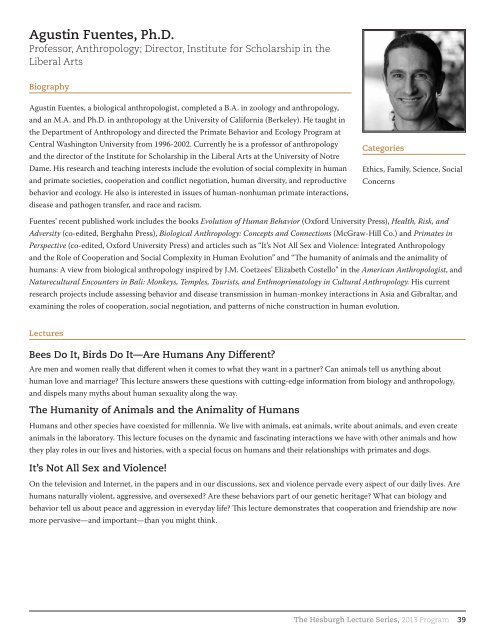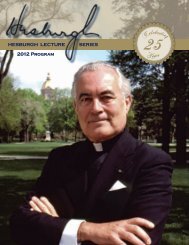HESBURGH LECTURE SERIES 2013 Program - Alumni Association ...
HESBURGH LECTURE SERIES 2013 Program - Alumni Association ...
HESBURGH LECTURE SERIES 2013 Program - Alumni Association ...
You also want an ePaper? Increase the reach of your titles
YUMPU automatically turns print PDFs into web optimized ePapers that Google loves.
Agustin Fuentes, Ph.D.<br />
Professor, Anthropology; Director, Institute for Scholarship in the<br />
Liberal Arts<br />
Biography<br />
Agustin Fuentes, a biological anthropologist, completed a B.A. in zoology and anthropology,<br />
and an M.A. and Ph.D. in anthropology at the University of California (Berkeley). He taught in<br />
the Department of Anthropology and directed the Primate Behavior and Ecology <strong>Program</strong> at<br />
Central Washington University from 1996-2002. Currently he is a professor of anthropology<br />
and the director of the Institute for Scholarship in the Liberal Arts at the University of Notre<br />
Dame. His research and teaching interests include the evolution of social complexity in human<br />
and primate societies, cooperation and conflict negotiation, human diversity, and reproductive<br />
behavior and ecology. He also is interested in issues of human-nonhuman primate interactions,<br />
disease and pathogen transfer, and race and racism.<br />
Fuentes’ recent published work includes the books Evolution of Human Behavior (Oxford University Press), Health, Risk, and<br />
Adversity (co-edited, Berghahn Press), Biological Anthropology: Concepts and Connections (McGraw-Hill Co.) and Primates in<br />
Perspective (co-edited, Oxford University Press) and articles such as “It’s Not All Sex and Violence: Integrated Anthropology<br />
and the Role of Cooperation and Social Complexity in Human Evolution” and “The humanity of animals and the animality of<br />
humans: A view from biological anthropology inspired by J.M. Coetzees’ Elizabeth Costello” in the American Anthropologist, and<br />
Naturecultural Encounters in Bali: Monkeys, Temples, Tourists, and Enthnoprimatology in Cultural Anthropology. His current<br />
research projects include assessing behavior and disease transmission in human-monkey interactions in Asia and Gibraltar, and<br />
examining the roles of cooperation, social negotiation, and patterns of niche construction in human evolution.<br />
Lectures<br />
Bees Do It, Birds Do It—Are Humans Any Different?<br />
Are men and women really that different when it comes to what they want in a partner? Can animals tell us anything about<br />
human love and marriage? This lecture answers these questions with cutting-edge information from biology and anthropology,<br />
and dispels many myths about human sexuality along the way.<br />
The Humanity of Animals and the Animality of Humans<br />
Humans and other species have coexisted for millennia. We live with animals, eat animals, write about animals, and even create<br />
animals in the laboratory. This lecture focuses on the dynamic and fascinating interactions we have with other animals and how<br />
they play roles in our lives and histories, with a special focus on humans and their relationships with primates and dogs.<br />
It’s Not All Sex and Violence!<br />
Categories<br />
Ethics, Family, Science, Social<br />
Concerns<br />
On the television and Internet, in the papers and in our discussions, sex and violence pervade every aspect of our daily lives. Are<br />
humans naturally violent, aggressive, and oversexed? Are these behaviors part of our genetic heritage? What can biology and<br />
behavior tell us about peace and aggression in everyday life? This lecture demonstrates that cooperation and friendship are now<br />
more pervasive—and important—than you might think.<br />
The Hesburgh Lecture Series, <strong>2013</strong> <strong>Program</strong> 39



